Is culture key?
Video playlist
Press review
Im Dauereinsatz für mehr Diversität Finanz und Wirtschaft vom 12.11.2018 lesen
Wie wichtig Kultur für den Erfolg ist Tagesanzeiger vom 21.11.2018 lesen
Warum Europas Staaten sich nicht näherkommen NZZ vom 21.11.2018 lesen
Ehe und Erben: Joseph Henrich erklärt den Aufstieg des Westens NZZ vom 4.12.2018 lesen
Insight
Culture and economics
Culture and economics are closely interlinked: a country’s economic success depends on the quality of its culture. This insight is not new, yet, it has long been ignored. It has returned, however, to the center of economists’ attention, as an event by the UBS Center showed in November.
Read our full Insight on Is culture key? by Kim Rechsteiner (UBS Schweiz).
Culture and economics
Culture and economics are closely interlinked: a country’s economic success depends on the quality of its culture. This insight is not new, yet, it has long been ignored. It has returned, however, to the center of economists’ attention, as an event by the UBS Center showed in November.
Read our full Insight on Is culture key? by Kim Rechsteiner (UBS Schweiz).

Intro

New insights on how culture affects economic prosperity
Culture is a set of shared attitudes, values, beliefs and behaviors. Culture shapes the way we interact, the way firms operate, and nations develop. How much do we value integrity, trust and honesty in a multicultural and diverse world? What drives economic performance: taking risks, or avoiding them? Cooperation or competition? Homogeneity or heterogeneity? Carrot or stick? Is it patience, after all. At this year’s Forum, we reflected on how prosperity and culture interact. We explored different culture plots, from cultural groups to organizations and nations. Italian economist and former Bocconi rector Guido Tabellini started with a provocative question “Does Europe belong together?” and analyzed whether culture is an obstacle for the European integration. Leading voices from academia and the corporate world discussed how culture drives success: from an economic, a business and a social perspective. And Joe Henrich, a human evolutionary biologist and anthropologist, ask what has made Western culture so strange – and so successful.
New insights on how culture affects economic prosperity
Culture is a set of shared attitudes, values, beliefs and behaviors. Culture shapes the way we interact, the way firms operate, and nations develop. How much do we value integrity, trust and honesty in a multicultural and diverse world? What drives economic performance: taking risks, or avoiding them? Cooperation or competition? Homogeneity or heterogeneity? Carrot or stick? Is it patience, after all. At this year’s Forum, we reflected on how prosperity and culture interact. We explored different culture plots, from cultural groups to organizations and nations. Italian economist and former Bocconi rector Guido Tabellini started with a provocative question “Does Europe belong together?” and analyzed whether culture is an obstacle for the European integration. Leading voices from academia and the corporate world discussed how culture drives success: from an economic, a business and a social perspective. And Joe Henrich, a human evolutionary biologist and anthropologist, ask what has made Western culture so strange – and so successful.
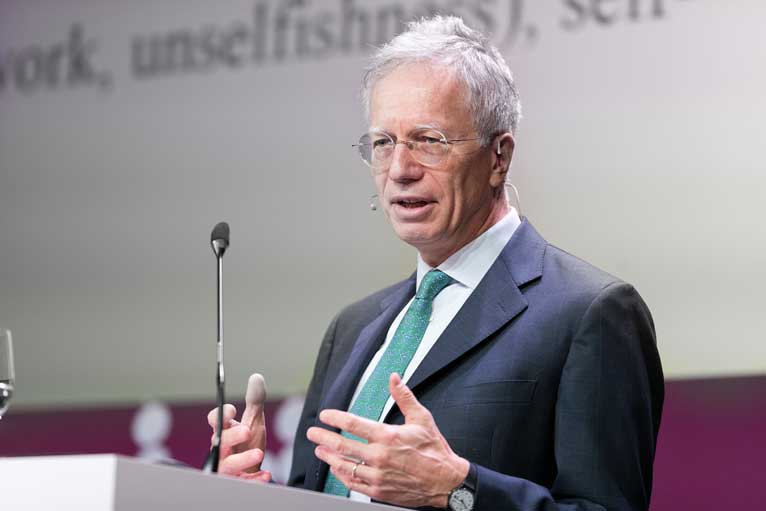


Photo gallery
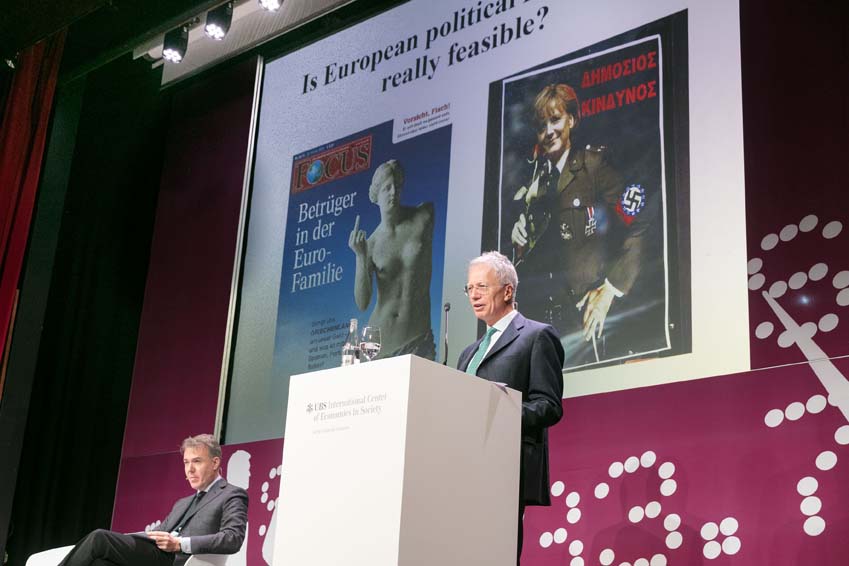
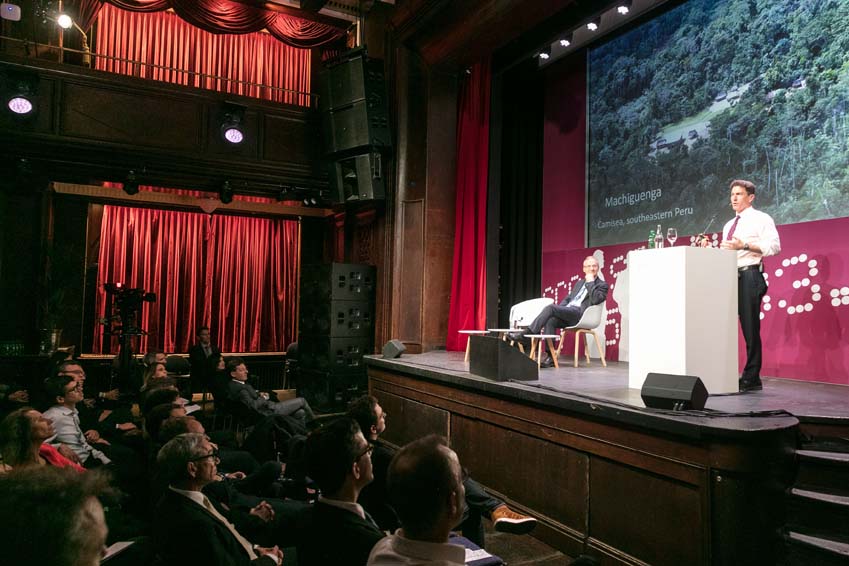
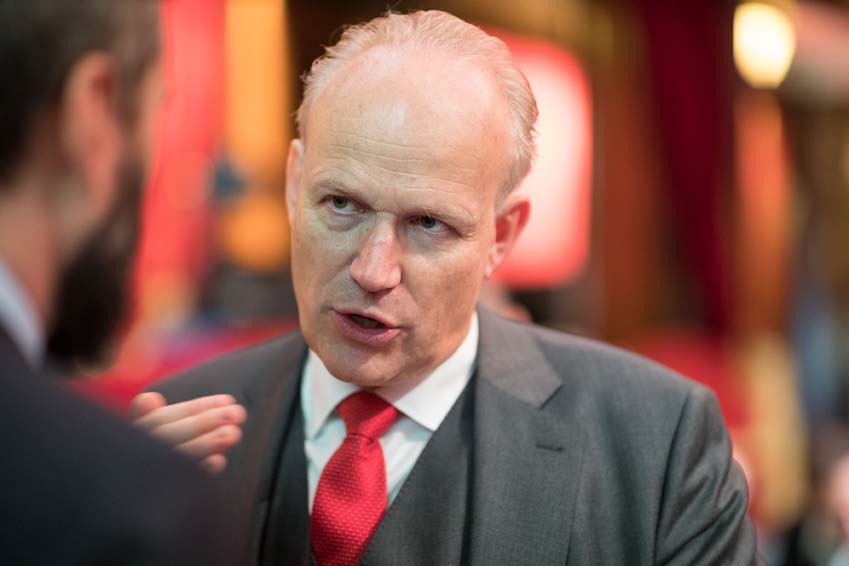
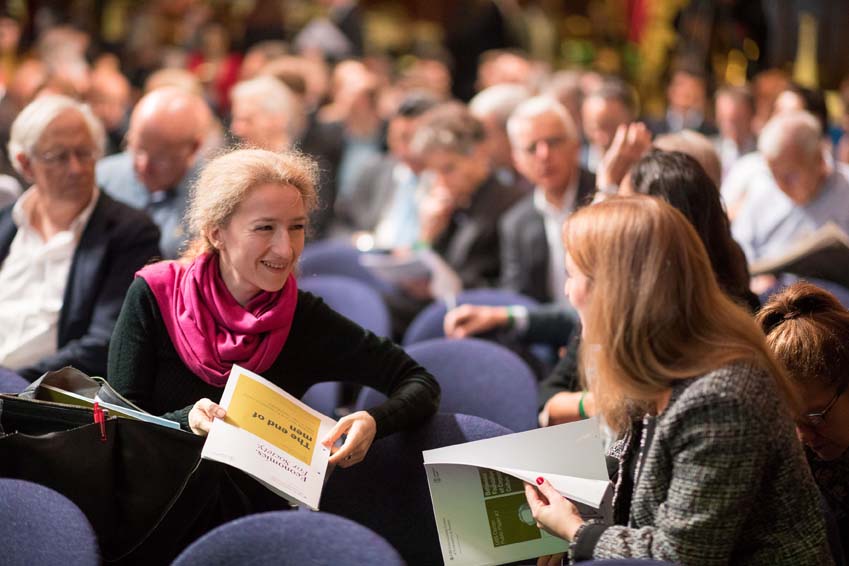
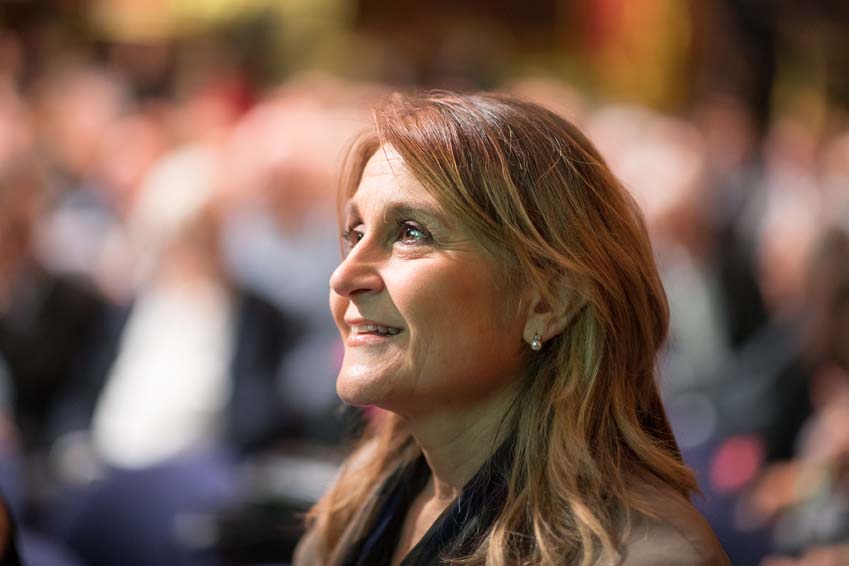
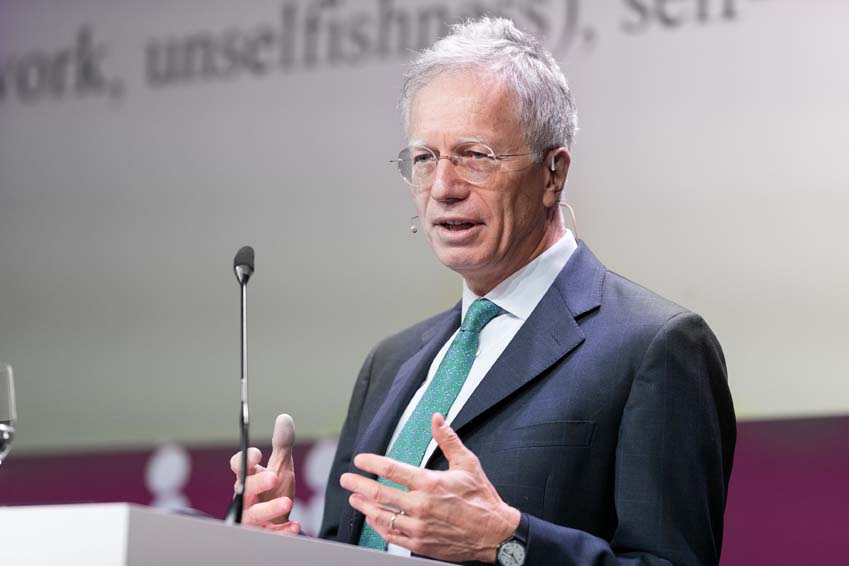

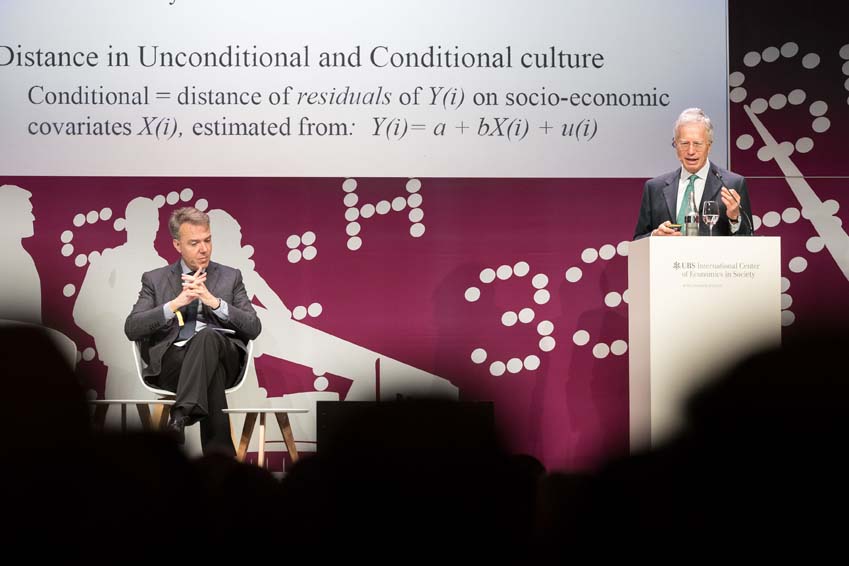
Literature
Torsten Persson, Guido Tabellini Political economics: explaining economic policy borrow
Joseph Henrich The secret of our success: how culture is driving human evolution, domesticating our species, and making us smarter borrow
Paul Collier, Rita Seuss, Martin Richter Die unterste Milliarde : warum die ärmsten Länder scheitern und was man dagegen tun kann borrow
Daron Acemoglu; James A. Robinson Why nations fail : the origins of power, prosperity, and poverty borrow
Prosperity Topic in the keyword index research
Program
Speakers
Guido Tabellini is a Professor of Economics at Bocconi University, where he was rector from 2008 to 2012. Since July 2013 Tabellini holds the Intesa Sanpaolo Chair in Political Economics. Before returning to Europe, he taught at Stanford and UCLA. He is a foreign honorary member of the American Academy of Arts and Sciences, a fellow of the Econometric Society, a fellow of the Canadian Institute for Advanced Research, and a recipient of the 2001 Yrjö Jahnsson Award. In 2007 he was President of the European Economic Association. Guido Tabellini is one of the world’s leading researchers in political and cultural economics. Much of his recent research has focused on culture in Europe.
Joe Henrich is a Professor and Chair of the Department of Evolutionary Biology at Harvard University and a senior fellow in the Canadian Institute for Advanced Research in the Institutions, Organizations and Growth Group. His research deploys evolutionary theory to understand how human psychology gives rise to cultural evolution and how this has shaped our species’ genetic evolution. Using insights generated from this approach, Professor Henrich has explored a variety of topics, including economic decision-making, social norms, religion, marriage, prestige and cooperation. He’s conducted anthropological fieldwork in Peru, Chile and in the South Pacific, as well as having spearheaded several large comparative projects on human sociality. His most recent book is W.E.I.R.D. People: How Westerners became psychologically peculiar and economically prosperous (forthcoming). His other books and edited volumes include The Secret of Our Success: How Culture Is Driving Human Evolution, Domesticating Our Species, and Making Us Smarter, Why Humans Cooperate (together with Henrich ), Foundations of Human Sociality: Economic Experiments and Ethnographic Evidence from 15 Small-Scale Societies (together with Boyd, Bowles, Camerer, Fehr, and Gintis) and Experimenting with Social Norms (together with Ensminger).
Armin Falk is a Professor of Economics at the University of Bonn and Chief Executive Officer of briq. He is Fellow of the European Economic Association, Director of the Bonn Laboratory for Experimental Economics, Associate Editor of the Quarterly Journal of Economics, and affiliated with Hausdorff Center for Mathematics, Institute for New Economic Thinking, Institute of Labor Economics (IZA), German Institute for Economic Research (DIW), Centre for Economic Policy (CEPR), CESifo, and the Max Planck Institute for Research on Collective Goods. Falk’s research focuses on determinants and consequences of time, risk and social preferences, sources of inequality, early childhood development, and the malleability of moral behavior. He has received two ERC grants and was awarded the Gossen Prize in 2008, the Leibniz Prize in 2009, as well as the Yrjö Jahnsson Award in 2011.
Alessandra Fogli is monetary advisor and assistant director in the research department at the Federal Reserve Bank of Minneapolis. Before joining the Minneapolis Fed in 2013, Fogli has been an assistant professor at New York University and at the University of Minnesota and an associate professor at Universita’ Bocconi. Fogli is also a faculty research fellow of the Center for Economic and Policy Research (CEPR). Fogli’s research explores how an individual’s social context, including family, neighborhood, school, as well as society at large, affects economic behavior and in turn aggregate economic outcomes, such as labor force participation and fertility patterns, output growth and income inequality. Her articles have been published in journals such as Econometrica, the Quarterly Journal of Economics, the Journal of Monetary Economics and the American Economic Journal.
Felipe Kast Sommerhoff is a Chilean congressman, an economist, and consultant. He was also a Presidential Candidate for the 2017 election. From 2010 to 2011, he was Minister of Social Development of Chile under the first Presidency of Sebastián Piñera. Following the earthquake on February 27, 2011 he was the Presidential Delegate for Chilean Reconstruction, 2011 to 2013. Kast has a PhD in public policy from Harvard University. His interest has always been focused on the design and implementation of public policies to overcome poverty. His academic work was recognized through several grants, most notably that of the Multidisciplinary Inequality and Social Policy Program at Harvard University.
David Yanagizawa-Drott received his PhD from IIES at Stockholm University in 2010. At that point, he was hired as Assistant Professor at John F. Kennedy School of Government, Harvard University. He was then promoted to Associate Professor in 2014. In 2016, he was hired as a full professor at University of Zürich. His research has shown that propaganda can cause violent conflict, studying the impact of hate media during the Rwanda Genocide. David has also examined the role of political protests in shaping policy outcomes and elections, establishing evidence that they can be highly effective in moving public opinion. In developing countries, a lot of his work focuses on the how to improve health outcomes and economic outcomes for poor households. In this line of work, for example, David implemented a randomized field experiment that showed that a simple Community Health Worker intervention in Uganda, based on a social entrepreneurship model, reduced child mortality by more than twenty percent. David is a member of several research networks, such as Poverty Action Lab (J-PAL), The Bureau for Research and Economic Analysis of Development (BREAD), European Development Research Network (EUDN) and Center for Economic Policy Research (CEPR). His work has been highlighted in various international media outlets, such as the New York Times, Washington Post, The Guardian, The Economist and various national TV news broadcasts in the U.S.
Ernst Fehr promovierte 1986 an der Universität Wien. Seine Arbeit hat gezeigt, wie soziale Motive die Zusammenarbeit, Verhandlungen und Koordination zwischen Akteuren beeinflussen und wie sich dies auf das Funktionieren von Anreizen, Märkten und Organisationen auswirkt. Seine Arbeit identifiziert wichtige Bedingungen, unter denen die Zusammenarbeit floriert und zusammenbricht. Die Arbeit an den psychologischen Grundlagen von Anreizen informiert uns über die Vorzüge und Grenzen finanzieller Anreize für die Vergütung von Mitarbeitern. In anderen Arbeiten hat er die Bedeutung der Unternehmenskultur für die Leistung von Unternehmen gezeigt. In neueren Arbeiten zeigt er, wie sich soziale Motive darauf auswirken, wie Menschen über Fragen im Zusammenhang mit der Umverteilung von Einkommen abstimmen und wie Unterschiede in der inneren Geduld der Menschen mit der Ungleichheit des Wohlstands zusammenhängen. Seine Arbeit hat innerhalb und außerhalb der Wissenschaft mit mehr als 100.000 Zitaten von Google Scholar große Resonanz gefunden, und seine Arbeit wurde mehrfach in internationalen und nationalen Zeitungen erwähnt.
Raffaella Sadun is the Thomas S. Murphy Associate Professor of Business Administration in the Strategy Unit at Harvard Business School. She is a Faculty Research Fellow at the National Bureau of Economic Research, Faculty Associate at the Centre for Economic Performance at the London School of Economics, Research Affiliate at the Center for Economic Policy Research and Research Associate in the Ariadne Labs Program in the Department of Health Policy and Management at Harvard T.H. Chan School of Public Health. Sadun’s research focuses on the economics of productivity, management and organizational change. Her research documents the economic and cultural determinants of managerial choices, as well as their implications for organizational performance in both the private and public sector (including healthcare and education). She is among the founders of the World Management Survey and the Executive Time Use Study.
Simona Scarpaleggia is the CEO of IKEA Switzerland where she oversees strategy and operations of the retail business including nine stores, e-commerce and distributions. Before joining IKEA Switzerland, she has held various positions in IKEA Italy and other multinational companies as senior executive and HR Director. She is a passionate campaigner for all issues surrounding women’s empowerment. In 2009, she co-founded «Valore D» in Italy and later «Advance – Women in Swiss Business» in Switzerland. Both organization have a mission to boost gender diversity and to increase the share of mixed-gender management teams for the benefit of customers, companies, economies and societies. In 2016, former UN Secretary-General Ban Ki-Moon appointed Scarpaleggia as co-chair of the High-Level Panel on Women’s Economic Empowerment in the context of the Global Goals for Sustainable Development.
Nir Jaimovich ist ein Makroökonom, der sich mit Konjunkturzyklen und der Dynamik des Arbeitsmarktes befasst. Er ist wissenschaftlicher Mitarbeiter am Centre for Economic Policy Research (CEPR) und Mitherausgeber des Journal of Monetary Economics und des Journal of Economic Theory. Bevor er an die Universität Zürich kam, war Professor Jaimovich an der Fakultät der Marshall School of Business an der USC, der Duke University, der Stanford University und der University of California, San Diego, tätig. Darüber hinaus war er wissenschaftlicher Mitarbeiter im Rahmen des Programms "Economic Fluktuationen und Wachstum" des National Bureau of Economic Research (NBER).
Sir Paul Collier is Professor of Economics and Public Policy at the Blavatnik School of Government and a Professorial Fellow of St Antony’s College. He is currently a Professeur invité at Sciences Po and a Director of the International Growth Centre. His research covers the causes and consequences of civil war; the effects of aid and the problems of democracy in low-income and natural resources rich societies; urbanization in low-income countries; private investment in African infrastructure and changing organizational cultures. His latest books are Exodus: How migration is changing our world and The Future of Capitalism: Facing the New Anxieties. In 2014, Paul received a knighthood for services to promoting research and policy change in Africa.
Born in London in 1949, the son of a Jewish émigré from Germany, Alan Posener grew up in Kuala Lumpur and West Berlin and was an activist for a Maoist party in the 1970s. He worked as a high school teacher for ten years before branching out as a freelance writer, journalist, translator and rock singer. In 2000, Posener joined the staff of Die Welt, where he edited the op-ed pages for several years. Today, he is an author at large for the paper. Posener has written many books, including biographies of Elvis Presley and the Virgin Mary. His book Imperium der Zukunft was an attempt to define the EU as a liberal empire with a global agenda. Benedikts Kreuzzug was a polemic against the German Pope. Die empörte Republik was a critique of anger politics.
Markus Spillmann is owner and CEO of SPILLMANN Media, Strategy Management GmbH and Partner of KMES, a Swiss consulting community specialized in complex leadership issues and crisis management. Apart from that he serves as President of the Foundation of the Swiss Media Council and as Chairman of the International Press Institute in Vienna (IPI). He is lecturer at various universities for media management and journalism. Before that, he was head of editorials and a member of the management board of the NZZ Media Group and Editor-in-Chief of the Neue Zürcher Zeitung (NZZ) from 2006 to 2014. His appointment followed over a decade of service as journalist with the Swiss daily newspaper.
Joachim Voth received his PhD from Oxford in 1996. He works on financial crises, long-run growth, as well as on the origins of political extremism. He has examined public debt dynamics and bank lending to the first serial defaulter in history, analysed risk-taking behaviour by lenders as a result of personal shocks, and the investor performance during speculative bubbles. Joachim has also examined the deep historical roots of anti-Semitism, showing that the same cities where pogroms occurred in the Middle Age also persecuted Jews more in the 1930s; he has analyzed the extent to which schooling can create radical racial stereotypes over the long run, and how dense social networks (“social capital”) facilitated the spread of the Nazi party. In his work on long-run growth, he has investigated the effects of fertility restriction, the role of warfare, and the importance of state capacity. Joachim has published more than 80 academic articles and 3 academic books, 5 trade books and more than 50 newspaper columns, op-eds and book reviews. His research has been highlighted in The Economist, the Financial Times, the Wall Street Journal, the Guardian, El Pais, Vanguardia, La Repubblica, the Frankfurter Allgemeine, NZZ, der Standard, der Spiegel, CNN, RTN, Swiss and German TV and radio.
Guido Tabellini is a Professor of Economics at Bocconi University, where he was rector from 2008 to 2012. Since July 2013 Tabellini holds the Intesa Sanpaolo Chair in Political Economics. Before returning to Europe, he taught at Stanford and UCLA. He is a foreign honorary member of the American Academy of Arts and Sciences, a fellow of the Econometric Society, a fellow of the Canadian Institute for Advanced Research, and a recipient of the 2001 Yrjö Jahnsson Award. In 2007 he was President of the European Economic Association. Guido Tabellini is one of the world’s leading researchers in political and cultural economics. Much of his recent research has focused on culture in Europe.
Joe Henrich is a Professor and Chair of the Department of Evolutionary Biology at Harvard University and a senior fellow in the Canadian Institute for Advanced Research in the Institutions, Organizations and Growth Group. His research deploys evolutionary theory to understand how human psychology gives rise to cultural evolution and how this has shaped our species’ genetic evolution. Using insights generated from this approach, Professor Henrich has explored a variety of topics, including economic decision-making, social norms, religion, marriage, prestige and cooperation. He’s conducted anthropological fieldwork in Peru, Chile and in the South Pacific, as well as having spearheaded several large comparative projects on human sociality. His most recent book is W.E.I.R.D. People: How Westerners became psychologically peculiar and economically prosperous (forthcoming). His other books and edited volumes include The Secret of Our Success: How Culture Is Driving Human Evolution, Domesticating Our Species, and Making Us Smarter, Why Humans Cooperate (together with Henrich ), Foundations of Human Sociality: Economic Experiments and Ethnographic Evidence from 15 Small-Scale Societies (together with Boyd, Bowles, Camerer, Fehr, and Gintis) and Experimenting with Social Norms (together with Ensminger).
Armin Falk is a Professor of Economics at the University of Bonn and Chief Executive Officer of briq. He is Fellow of the European Economic Association, Director of the Bonn Laboratory for Experimental Economics, Associate Editor of the Quarterly Journal of Economics, and affiliated with Hausdorff Center for Mathematics, Institute for New Economic Thinking, Institute of Labor Economics (IZA), German Institute for Economic Research (DIW), Centre for Economic Policy (CEPR), CESifo, and the Max Planck Institute for Research on Collective Goods. Falk’s research focuses on determinants and consequences of time, risk and social preferences, sources of inequality, early childhood development, and the malleability of moral behavior. He has received two ERC grants and was awarded the Gossen Prize in 2008, the Leibniz Prize in 2009, as well as the Yrjö Jahnsson Award in 2011.
Alessandra Fogli is monetary advisor and assistant director in the research department at the Federal Reserve Bank of Minneapolis. Before joining the Minneapolis Fed in 2013, Fogli has been an assistant professor at New York University and at the University of Minnesota and an associate professor at Universita’ Bocconi. Fogli is also a faculty research fellow of the Center for Economic and Policy Research (CEPR). Fogli’s research explores how an individual’s social context, including family, neighborhood, school, as well as society at large, affects economic behavior and in turn aggregate economic outcomes, such as labor force participation and fertility patterns, output growth and income inequality. Her articles have been published in journals such as Econometrica, the Quarterly Journal of Economics, the Journal of Monetary Economics and the American Economic Journal.